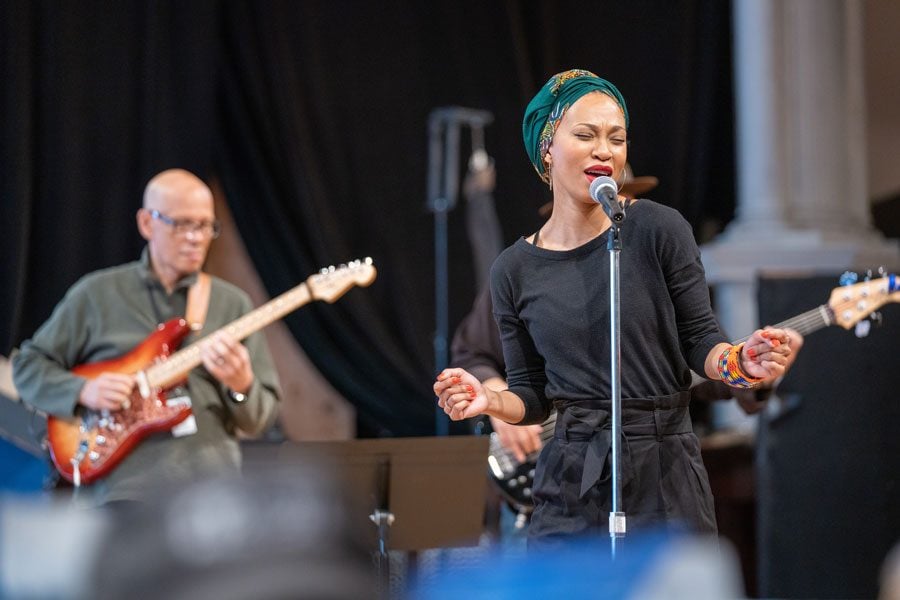Ladysmith Black Mambazo and Steppenwolf Theatre reunite for “Lindiwe”
Nondumiso Tembe (Lindiwe) in rehearsal for Steppenwolf’s world premiere of Lindiwe.
November 7, 2019
When Communication Prof. Kärin Kopischke first moved to Chicago from the West Coast in the early ’90s, she worked as an assistant costume designer for “The Song of Jacob Zulu” at Steppenwolf Theatre. The play was a collaboration between Steppenwolf and Ladysmith Black Mambazo, a five-time Grammy winning South African male choral group well-known for being featured on Paul Simon’s 1986 album “Graceland.” Now, over twenty years later, Kopischke is costume designing Ladysmith’s return to Steppenwolf, “Lindiwe.”
Inspired by the myth of Eurydice and Orpheus, “Lindiwe” follows the love story between the titular character, a singer from South Africa, and Adam, a blues drummer from Chicago. The two bond over their shared passion for music, but their relationship is tested by both distance and cultural differences. The show opens Nov. 7 at Steppenwolf’s Downstairs Theatre and runs through Jan. 5.
“It’s a really unique piece of theater,” Kopischke said. “It’s not a play, but it’s not a musical theater. It’s a play with music, but it’s somehow more than just that.”
“Lindiwe” is the third collaboration between Steppenwolf and Ladysmith, following the productions of “The Song of Jacob Zulu” and “Nomathemba (Hope)” in 1995. Jonathan Berry (Communication ’07), the artistic producer at Steppenwolf and co-director of “Lindiwe,” said the play shines a spotlight on Ladysmith’s guiding philosophy. As a group, Berry said they believe music has the power to unite people in spite of their differences.
Berry added that members of Ladysmith act as a greek chorus for the story and developed the music for the show. The group conducted several music rehearsals, which took place entirely in Zulu, where they also mapped out and developed the choreography.
“It’s been a remarkably collaborative experience that feels very organic in the moment,” Berry said. “As we’re building it and responding to a new script that is changing, they are very much engaged in the process and seeing it through their lens.”
Erik Hellman (Communication ’03), who plays Adam, said he’s been a fan of Ladysmith Black Mambazo since he was 13 or 14, when he saw their concert in D.C. As a musician, Hellman said it’s been rewarding to learn about Ladysmith’s musical style and the formation of their melodies. The group does not use backing music, Hellman said, but instead rehearse rigorously to develop their vocal harmonies.
According to Hellman, “Lindiwe” mixes heightened theatrical elements with a realistic and relatable story. The show includes many energetic pieces and incorporates a vibrant design aesthetic. Still, the relationship between Lindiwe and Adam and the strain that forms between them is presented with nuance and sympathy to both characters, Hellman said.
“There are these huge musical numbers and large tech heavy transitions and then very small interpersonal scenes about relationships, breaking up and how hard it is to be in love with someone,” Hellman said. “It’s got a really nice mix of the theatrical and the real.”
Kopischke said the story deals heavily with loss and grief, which has struck a chord personally for the Steppenwolf community since the rehearsal process started. Both former artistic director Martha Lavey and stage manager Malcolm Ewen passed away recently, Kopischke said. Because of these losses, the cast and the crew have responded strongly to the themes of learning how to move on and accept the loss of a loved one.
Pointing to music as a force to unite people, Berry said “Lindiwe” is both timeless and relevant. Although he admits it’s not a revolutionary statement, Berry said there’s power in telling a story about human connection when people are living in a very divided time.
“There’s something that happens when you hear the music from Black Mambazo,” Berry said. “It ends up reaching something that’s deeper and more connected to the universal human soul, something that says we’re a part of something larger and bigger than ourselves.”
Email: [email protected]
Twitter: @wilsonchapman6


